Latest Contributions
Read More Contributions
My Nanaji: A Sublime Extremist
Category:
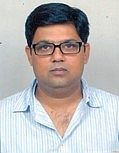
Gaurav Mathur, 41 lives in Ahmedabad with his wife, Poonam, and son Saksham. He practises law. He did his schooling at Jaipur and Ahmedabad after which he completed his graduation in BA (Hons) Economic from University of Rajasthan and law from MLB Arts and Commerce College, Gwalior.
Editor's note: Prof. Brij Mohan Lal Bhatnagar, M.A., M. (Com) was born on 30th December, 1914 at Khurja, District Bulandshahr, Uttar Pradesh. He retired as Principal, Government College, Dausa, District Dausa, Rajasthan. He passed away on 25.8.1994.
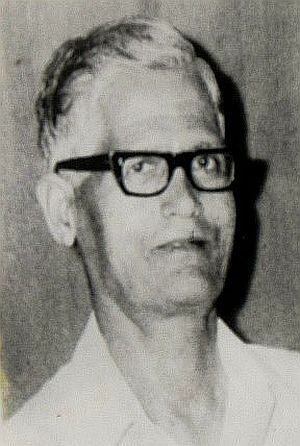
Prof. Bhatnagar
His grip on my hand tightened. I was enjoying what I heard but the increasing pressure demanded my attention. He was immersed in his enjoyment. Ahmad Hussain and Mohammad Hussain reached the makta (Makta is the last couplet of a Ghazal where the poet usually makes a reference to himself in a unique way and lends his poetry, which is otherwise a general comment, a personal touch) of Daanish Alagiri's Ghazal that was playing. Ahmad Hussain, after rendering the misra (First line of a Urdu couplet) with many a variation within the Raga, was crooning "..... usko meri aakhon ki putliyaan samajhti hain"
I turned towards him, and saw his eyes are shut. Teardrops emerged, on the verge of finding their way to anonymity. Beaming, his smile was one of pleasure, the kind one would experience in anguish. The 300 watt RMS Sony music system, which has given me some of the best musical memories with its towering speakers and glass console, was going silent. The Ghazal was ending with the sound of tabla fading.
Nanaji opened his eyes. He looked at me from deep within, and said, "it's beautiful, beta!"
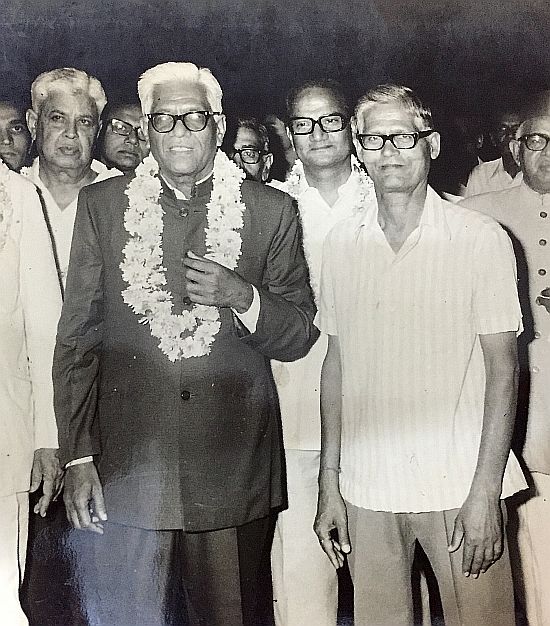
Left: Shri Khem Chand (with garland), my Babaji, Right: Prof. Bhatnagar, my Nanaji. Jaipur 1974. At my parents' wedding.
Most people credit my paternal grandfather (Babaji) for my inclination towards poetry. They are not wrong. They aren't entirely correct either. My paternal grandfather played a crucial role in instilling the interest, especially in Urdu poetry. But his approach was stoical. He never allowed his passion for poetry express itself with a sense of abandon. It was Nanaji who initiated the quest for a poet's anguish. That is where the connect lay. These contrasting influences don't always let one settle down. But both Babaji and Nanaji harboured genuine respect for each other's wholly different personalities. I, too, learnt to allow these paradoxes to coexist, perhaps by not allowing them to mingle too often!
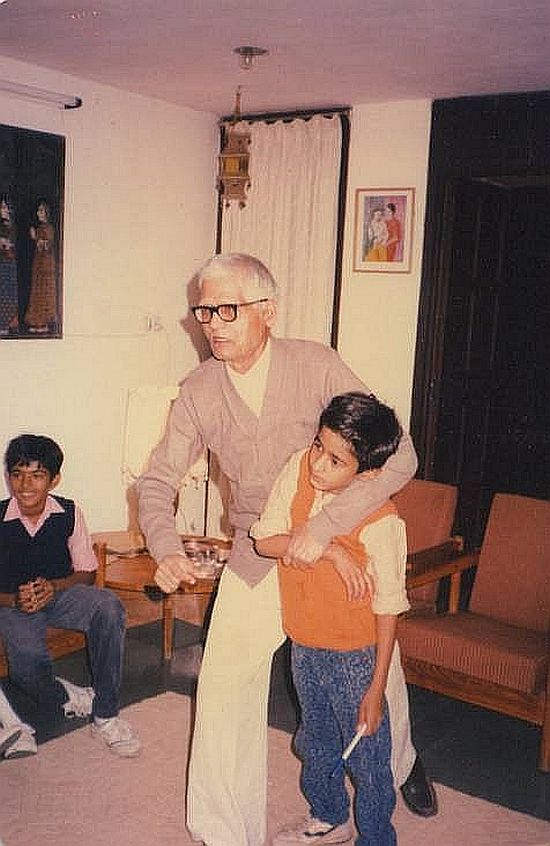
Nanaji with grandsons Gaurav (sitting) and Tushar. Ahmedabad. 1989.
If ever one had to comprehend the true essence of the phrase, ‘wearing his heart on his sleeve', the best way would be to meet Nanaji. He had no pretence. No ill will. If he liked anything he would like it till eternity. And if he disliked, it was unending. He truly believed that India will change with the advent of the National Front government headed by V.P. Singh. If he could, he would alone cast the billion votes, to bring it to power. It did come to power though on a slender footing. Nanaji's hopes didn't dampen and he waited for deliverance.
Then, the reservation issue caught fancy and India was in turmoil. Nanaji's unending belief turned into a deep-seated dislike. He couldn't believe that the government would treat Indians differently. It wasn't that he did not believe in alleviating the down trodden. He just didn't approve of doling out reservation, as a crutch, as if it were a panacea. His voice was not amongst the popular strains resounding on the streets. But he was right in a way. Twenty- five years later, the government is realising subsidies aren't the right way to aid the economically downtrodden. It only cumulates the problem.
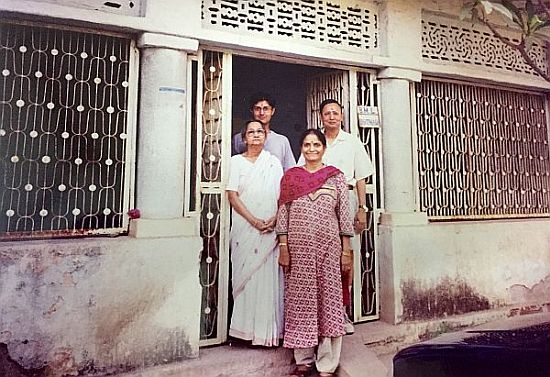
L to R: Mrs. Ramani Bhatnagar (my Naniji), Saurabh Bhatnagar (my cousin, son of Subhash and Deepti Bhatnaagr), Prof. Deepti Bhatnagar (wife of Subhash Bhatnagar), Prof. Subhash Bhatnagar (Prof. Bhatnagar's son). At Nanaji and Naniji's Kota home. 1993.
Such simplicity, bordering on naivety, is an exceptional quality for a teacher. Nanaji excelled at his profession both as a teacher and, as an administrator when he became the Principal of Government College, Dausa (Rajasthan). He is credited not only for being a great teacher but also a reformer. Many a rowdy element he taught was reformed and took to more respectable ways of earning a living. One, I clearly remember and shudder to state, became a lawyer!
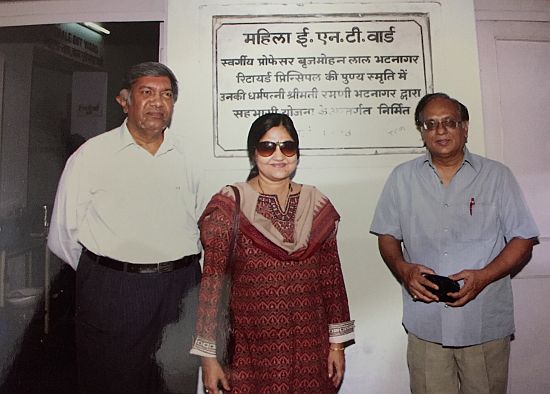
L to R: Unidentified hospital staff member, Tilak Mathur (my mother), Subhash Mathur (my father) visiting the ENT ward for women in year 2006. This ward was created in my Nanaji's memory by a donation given by my Naniji (under PPP program) in memory of my Nanaji in Government Hospital, Kota in May 1998.
Nanaji also enjoyed doing things the right way, doing them well and earning his accolades. He would sometimes relate how his good work got him admiration from superiors. He would not be boasting. He wasn't in that mould. I felt he was trying to convey an important message that when you do the right thing and do it well, then the recognition that comes with it is an everlasting memory. In a way he urged us to realise the importance this message. How absolutely correct he was.
He was a flamboyantly proud father though, a fact and sentiment he shared with Babaji.
He ensured both his children got the best education possible. He sent them to residential schools at a tender age. But it did take some effort for him to accomplish this task! His daughter, my mother, Tilak, was offered admission in the Maharani Gayatri Devi (MGD) School at Jaipur. At the age of 8, she was to shift to a hostel. From what I know, at the moment of separation, Nanaji cried just as much my mother did! In fact he made a volte face and came back from the Railway station instead of boarding the train to Kota, where he lived, to take my mother back home. The family in Jaipur, who were to be her guardians, stone-walled this emotional attempt and my mother finished her schooling at MGD and higher education at University of Rajasthan, where she met my father.
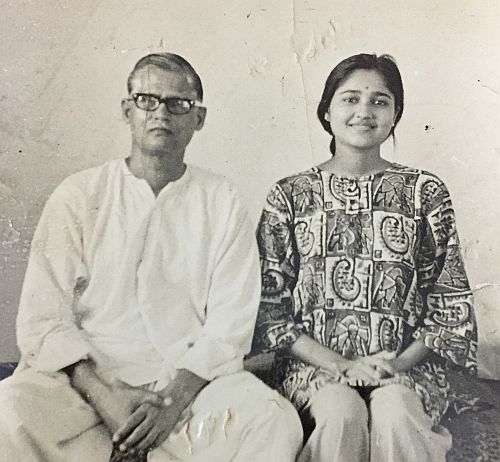
Nanaji with my mother, Tilak Kota. 1972.
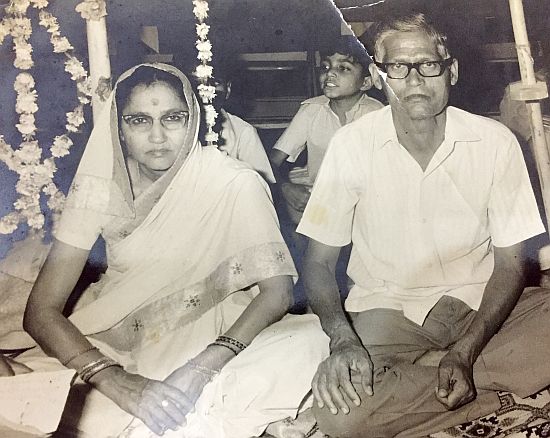
My Naniji and Nanaji at my parents' wedding. Jaipur. 1974
His son, my mama (maternal uncle) Subhash went to Mayo College, a boarding School at Ajmer, which was and still is a premier educational institution. He later went to IIT Madras (now Chennai) and IIM Ahmedabad, where he settled for life to become a leading name in the world of Information Technology and e Commerce.
It was at his house in IIM campus at Ahmedabad where Nanaji and I were listening to Daanish's ghazal. Mama's benefactions to me are many but the fact that he got me my first Walkman in 1988, an Aiwa which had equalisers, comes up trumps! Munni Begum, Mehndi Hassan and Jagjit Singh have resonated in my ears since then. Long before I could marvel at Nanaji's ability to let go while listening to poetry, these wonderful gifts from Mama had ensured that I spent time, daily, listening to poetry, an interest Babaji helped instil and Nanaji helped accentuate.
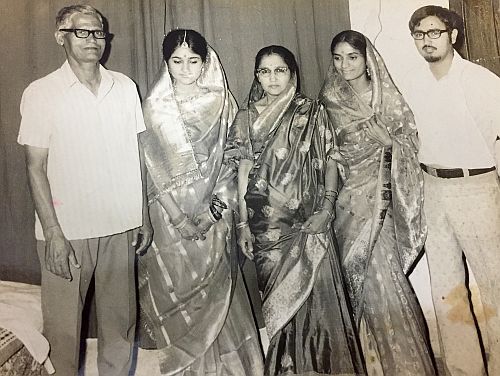
L to R: Prof. Bhatnagar, Tilak Mathur (my mother), Mrs. Ramani Bhatnagar (my Naniji), Prof. Deepti Bhatnagar, Prof. Subhash Bhatnagar. At my parents' wedding. Jaipur. 1974.
By now the Ghazal had ended. Nanaji eventually released his grip on my hand. Little did he know that he left imprints indelibly etched at a place where I can still feel the pressure.
© Gaurav Mathur 2016
Comments
Add new comment